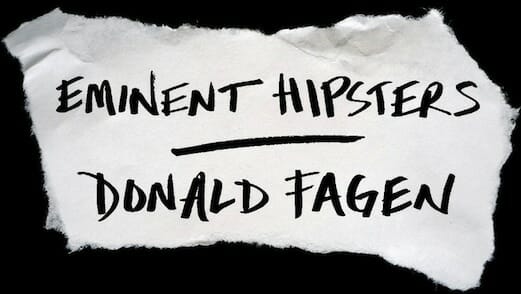Eminent Hipsters by Donald Fagen
Hey 19—You Suck!

This memoir by Donald Fagen of Steely Dan coheres loosely: It’s a series of semi-biographical but not necessarily related essays—reflecting on Fagen’s youth and musical influences—combined with a tour diary from 2012.
Fagen reminisces about seeing jazz greats at the Village Vanguard, joins the Sci-Fi Book Club and comments on the endless stream of hotel rooms he encounters on the road. Like Fagen’s music, the book puts a premium on style, sometimes at the cost of substance.
Fagen’s heyday? The ‘70s, when he helmed Steely Dan with Walter Becker. Their first album, Can’t Buy a Thrill, quickly joined the pantheon of classic rock records. Fagen took over vocals for the second album, and the music grew more adventurous through the middle of the decade. Fans and critics made much of the way the group mixed jazz, pop, rock, blues and soul, their love of surprising chord changes, and the high-priced musicians the boys used in the studio—Steely Dan music required more than rock chops.
By 1978, with Aja, the group got roped in with yacht-rock, the luxurious soul music made by white smoothies: Hall and Oates, the Doobie Brothers, Boz Scaggs. (In this book, Fagen narrates events from his tour with Scaggs and Michael McDonald, former Doobie.) Aja’s grooves stay tight, the electric keyboard shiny, the horns, solos and backup singers tasteful. Think of it as R&B delivered in highly controlled—sometimes sterile—doses.
Fagen’s music drew adjectives like smart and cynical. (The critic Robert Christgau called their music “intellectual cocktail rock,” capturing both qualities.) In his book, Fagen likes to rattle off zingers. “[T]he crowd looked so geriatric I was tempted to start calling out bingo numbers,” he writes. Amusing, though maybe not in the best taste to make fun of the folks who keep you in business.
The jokes work better with dead targets—“as Freud liked to say, the superego is soluble in alcohol.” They work best of all when Fagen makes fun of himself. “Before a show, I try to evoke and maintain a condition of mental clarity and controlled energy, which is to say, I play a lot of R&B records on my computer and drink twelve cups of coffee.” Sounds like a recipe for success.
Still, there exists a thin line between talking smart and loving the sound of your own voice. Fagen includes an interview he conducted with the famous film-scorer Ennio Morricone for Premiere Magazine in 1989. “[I]sn’t it true,” he asks Morricone, “that your scores function both ‘inside’ the film as a narrative voice and ‘outside’ the film as the commentary of a winking jester? Put it all together and doesn’t it spell ‘postmodern,’ in the sense that there has been a grotesque encroachment of the devices of art and, in fact, an establishment of a new narrative plane founded on the devices themselves?”
Is there a translator in the house? Morricone just shrugs in response. What else could he do?
Fagen unabashedly wishes for the old days, and rains a steady stream of criticism on the younger generation—which sometimes stretches to include everyone born in the last 53 years.
He laments the existence of television. “By ‘TV Babies’ I mean people who were born after, say, 1960, when television truly became the robotic caretaker of American children and therefore the principal architect of their souls.” He stole the term from Matt Dillon’s Drugstore Cowboy; hopefully he saw it in a movie theater.
And don’t get him started on newfangled portable telephones.
-

-

-

-

-

-

-

-

-

-

-

-

-

-

-

-

-

-

-

-

-

-

-

-

-

-

-

-

-

-

-

-

-

-

-

-

-

-

-

-








































